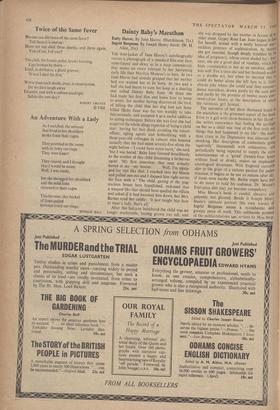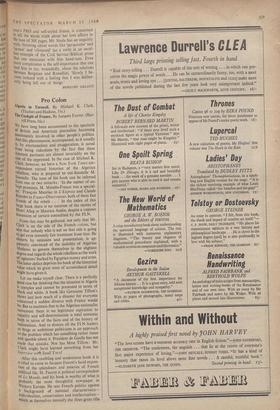Dainty Baby's Marathon
TitE dust-jacket of June Havoc's autobiography carries a photograph of a standard film-star face, open-lipped and dewy as in a soap commercial, that seems no more relevant to her harrowing early life than Marilyn Monroe's to hers. At two June Havoc had already grasped that her mother had not wanted her to be born. At two and a half she had learnt to earn her keep as a dancing star called Dainty Baby June. At three she had made her first film and knew how to weep to order, her mother having discovered the trick of telling the child that her dog had just been killed (Baby June was far too worldly to take this seriously, and accepted it as a useful addition to acting technique). Before she was four she had acquired the whole dingy expertise of being a child star: having her hair dyed, avoiding the truant- officer, ogling agents and hobnobbing with a three-year-old colleague in cabaret who boasted casually that she had eaten seventy-five olives the night before—'I could have eaten more,' she said, 'but I was bored.' Baby June listened breathlessly to the mother of this child discussing a lecherous agent. 'My first interview, that man actually leered at my—my bosom. . . . Well, I'm equip- ped for rats like that. I reached into my blouse and pulled one out and I slapped him right across the face with it.' The child, gazing at the pug- nacious breast here brandished, reckoned that a weapon like that should have quelled the villain and asked if it had knocked him down, but Mrs. Barnes eyed her coldly : 'It just taught him how to treat a lady, that's all.:
After this halcyon babyhood the child was no longer marketable, having grown too tall, and
she was dropped by her mother in favour of he; elder sister, Gypsy Rose Lee. June began to fen° for herself, armed with a steely humour and 3 reckless pretence of sophistication. At thirteco she got married, though deeply troubled by 1111 idea of pregnancy, whose cause eluded her: how ever, she ate a good deal of vaseline, which hael been commended, to her as an antidote, and al; was well. For a time she and her husband worked as a double act, but when he decided that he could do better alone she left him to it, found chorus jobs where she could and then entered 3 dance marathon, drawn partly by the cash Prize • and partly by the promise of twelve meals even' twenty-four hours, at the description of which the ravenous girl fainted. The narrative of her three thousand hours in the marathon is the grimmest aspect of the book. Even to a girl with show-business in her blood-- she writes somewhere that feeling the spotlight on her as a child was 'one of the first truly real
things that had happened in my life'—the mark thon craze in the Depression was aberrant and shocking. Her description of contestants going `squirrelly' (demented) with exhaustion, and ' periodically being expected to supply the extra entertainment of a 'grind' (twenty-four hours without food or drink), makes an unpleasant sociological document. With England currentlY also in the grips of a curious passion for pedes• trianism, it begins to be not so remote after all if times were harder Mr. Butlin might have had to do more to hold his audience. Dr. Moore 's fruit-juice diet may yet become compulsory. Miss Havoc's book is candid, abrasive and palpably not ghosted. Beside it Joseph Henry Steele's intimate portrait (his own words) of Ingrid Bergman seems a sycophantic and gossipy piece of work. This unlikeable product of the public-relations age. %%ritten by Miss Berg
bet fed nd a rtC y tha holy' had d al rked t he )und ed 3 man's PRO and self-styled friend, is concerned to tell the whole truth about her love affairs to the tune of 368 pages. Mr. Steele has an ungainly Style, throwing about words like 'perquisites' and frapouse' and 'climaxed' (as a verb) in an excel- lent example of the Civil Service/Biblical prose that one associates with film hand-outs. Even more conspicuous is the self-importance that can lead him to say, woundedly, about the relations between Bergman and Rossellini, 'Slowly I be- came imbued with a feeling that I was deliber- ately being left out of things.'
PENELOPE GILLIATT



















































 Previous page
Previous page